Why were the inhabitants of medieval Europe afraid to wash
Even from school history lessons, we remember that in the Middle Ages, European cities were real cesspools. Sewage flowed through the streets in streams, in which rats swam, smells knocked off their feet, and dirty, foul-smelling people scurried among all this splendor. Yes, in that era, many people washed only twice — after being born and before burial, but few people know the reason for this attitude to personal hygiene. We will tell you where the medieval citizens got the fear of washing and how they managed to overcome it.
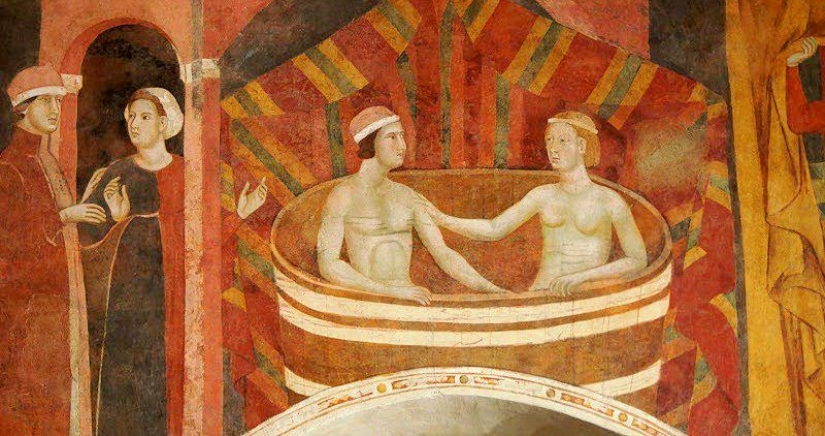
In ancient times, the cult of the body and purity reigned. The "dark pagans", who did not know the grace of Christianity, constantly washed and washed, and aqueducts-water pipes, thermal baths and even public toilets with a semblance of toilet paper worked in the cities. In ancient Rome, even beggars had the right to free access to the bath and willingly used it.
Roman Baths
But Christianity came and the desire for purity remained in the past. Instead of striving for perfection and cleanliness, the new faith brought dirt and eradicated the habit of Europeans to wash and generally take care of themselves. This did not happen immediately and in the first centuries of the new faith, the baths were still working. But the numerous requirements of Christianity made the washing process very troublesome.
On the one hand, the Holy Scriptures encouraged the pursuit of purity, but on the other hand, Christians were forbidden to visit baths together with representatives of other faiths: pagans, Muslims and Jews. The greatest problem in this regard was created by the Jews, who have lived in Europe for a long time, preserving their faith and customs.
It was not easy to distinguish a Jew from a Christian, especially in a bathhouse, where visitors wore only loincloths from clothes. A zealous Christian, having washed next to a Jew, considered himself defiled and this was a serious problem. As a result, the churchmen found no other solution than to introduce a ban on public baths. From that moment on, it was possible to wash in reliable, private institutions, where only Christians came. But there were few such places, and the fee for visiting them "bit".

With the onset of the 6th century, the situation was aggravated by the Great Cold Snap, which lasted for more than three centuries. Since only wood was used as fuel at that time, firewood prices jumped, and landowners began to closely monitor that loggers-poachers did not manage their forests. Nevertheless, the giant relic forest that occupied the territory of almost all of Europe was almost completely cut down for several centuries and good fuel became a shortage.
It was stupid to spend valuable wood not for heating housing and cooking, but for some kind of washing, and gradually the baths disappeared from the life of Europeans. In the 11th century, the cold receded and the climate normalized, but by that time the habit of washing seemed strange to many, even suspicious.
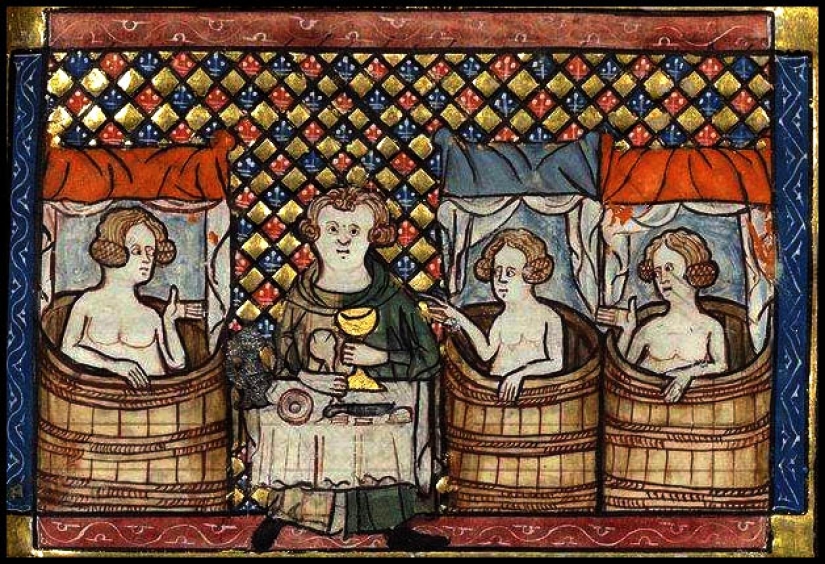
In 1526, the famous Dutch scientist Erasmus of Rotterdam, nicknamed the "prince of humanism" for his advanced views, wrote:
The onset of another cold snap again raised the price of firewood and it became expensive to swim. The rejection of hygiene led to the spread of diseases and among the many deadly ailments was the plague, which in the 14th century had already gathered a bountiful harvest in Europe. As before ,the "black death" came from the East, from China, and again the main distributors of it were fleas.
The baths created ideal conditions for infection. Insects jumped from the things and bodies of infected people to the clothes and bodies of healthy people, contributing to the rapid spread of the infection. People noticed a link between the incidence and visiting public baths and drew appropriate conclusions. Uneducated Europeans decided that washing was the cause of a deadly disease and began to avoid baths.
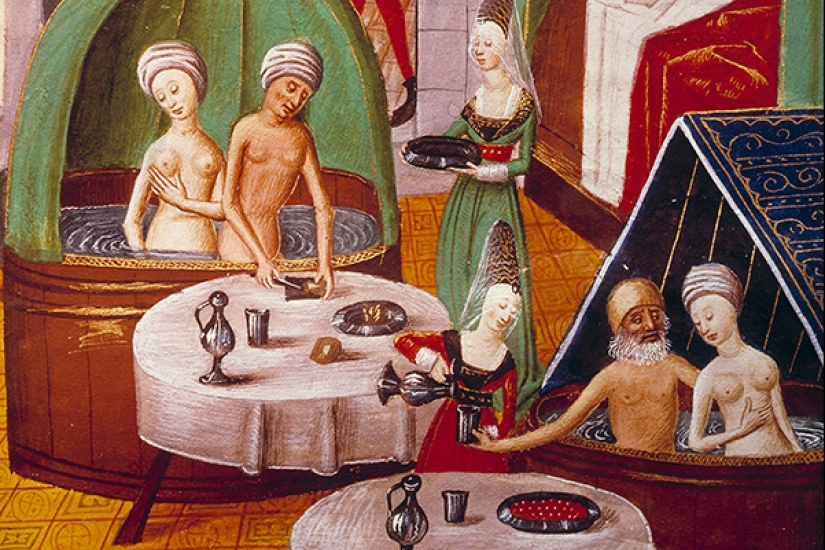
In the 16th century, rich citizens washed in private baths 2-3 times a year, and already in the 17th and 18th centuries, most Europeans completely stopped washing. The church, with its strict canons and views on life, contributed a lot to this. At the dawn of the Renaissance, people admired ancient sculptures and believed that by improving themselves, you can become closer to God. But with the advent of the Reformation, the point of view on the flesh changed and the body began to be considered a vessel of sin.

Isabella of Castile
By the beginning of the 16th century, everything had become so bad that for a sincere desire for the purity of the body, you could get a pencil to the inquisition. But no one really wanted to wash — Isabella of Castile, the queen of Spain, a virtuous and pious woman, left behind a record in which she proudly reported that she had washed twice in her life — at birth and on the wedding day. Apparently, the queen was washed again before being taken to the tomb.
Russian soldiers returned Europe to purity during the Napoleonic campaigns. In 1813-1814, the Russian army occupied Paris and was stationed in the French capital. Since the life of a Russian person is impossible without a bath, they were immediately organized. Once a week, the military went in noisy crowds to the steam rooms, where, groaning and laughing, they whipped themselves to exhaustion with oak brooms. For Parisians who had never seen such paintings, the Russian bath seemed like a kind of branch of hell.
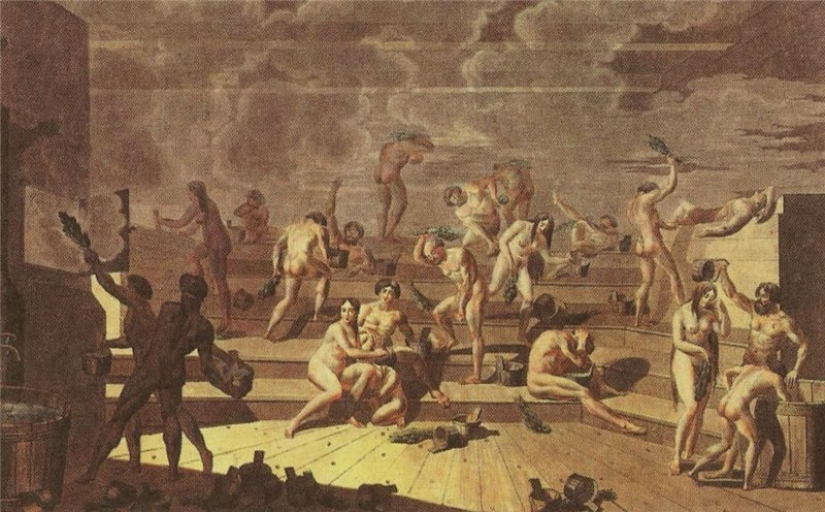
In 1818, the first public bath opened in Berlin. It remained the only one in the country for many years. The reaction of an "enlightened" European to a Russian bathhouse is well described by Alexander Dumas in the novel "The Fencing Teacher", published in 1840. The author with a great sense of humor showed the horror of a foreigner who found himself in one of the "temples of purity" of the Russian capital.
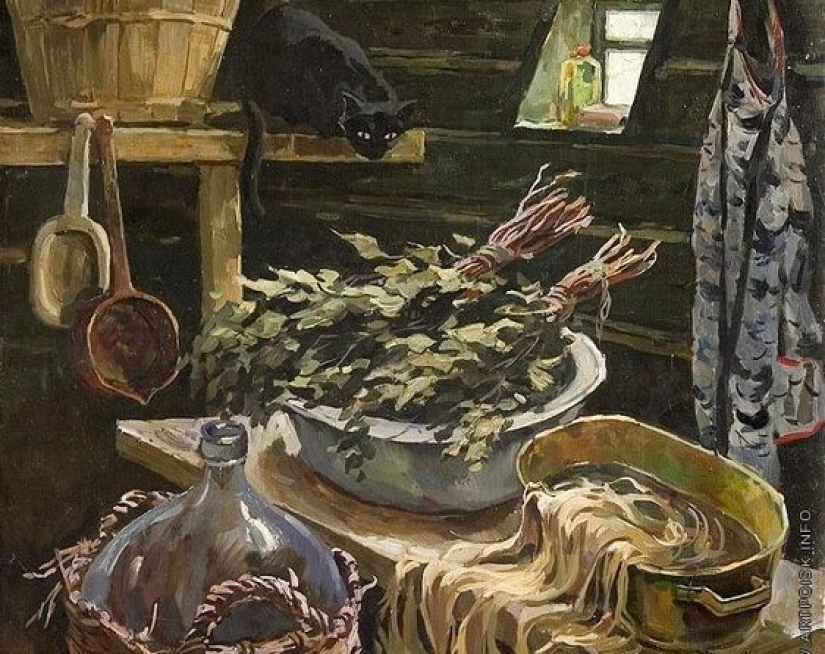
And although the attitude to washing in Europe has changed, Westerners still do not understand how Russians can wash so many times a day, and at the resort they also do not get out of the pool or the sea for hours.
Keywords: Bath | Hygiene | Medicine | Church | Plague | Epidemic
Post News ArticleRecent articles

It's high time to admit that this whole hipster idea has gone too far. The concept has become so popular that even restaurants have ...

There is a perception that people only use 10% of their brain potential. But the heroes of our review, apparently, found a way to ...
Related articles

"Wash your hands before eating!" — a phrase familiar to us since childhood. The parents explained that with the help of this ...

American artist Lee Price is sure that eating is a completely natural process, but many are ashamed of their attitude to food, ...

Many men avoid this topic, but very wrongly … After all, such an elementary process as shaving testicles, in fact, involves a ...

New Year's is a time to surprise and delight loved ones not only with gifts but also with a unique presentation of the holiday ...